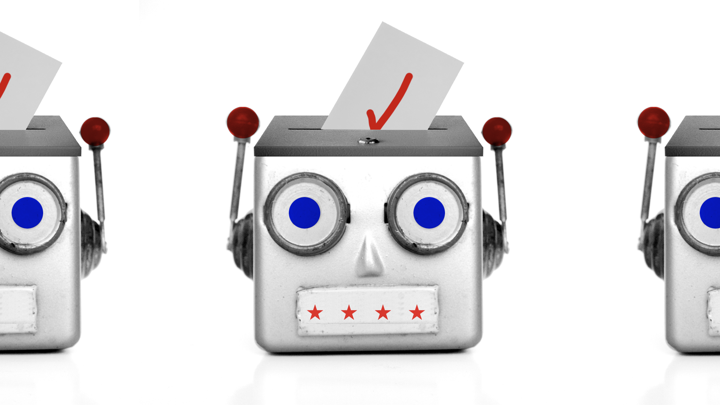Last Week in AI #47
AI Export Limits, Politics Bots, and more!

Image credit: THE ATLANTIC / GETTY
Mini Briefs
U.S. government limits exports of artificial intelligence software
The U.S. government enacted a new rule that mandates companies exporting “geospatial imagery software” commonly used for military applications (for example, to identify targets from drone) but also for civilian applications must first apply for a license. This export rule stems from a 2018 law, “which tasked the [Commerce Deparment] with writing rules to boost oversight of exports of sensitive technology to adversaries like China, for economic and security reasons.”
It’s worth noting that the export limit is fairly small and “will likely be welcomed by industry […] because it had feared a much broader crackdown.” Whether the rule is effective in practice remains to be seen, as the AI community is generally fairly open to sharing developments, code, and data freely on the Internet.
The Future of Politics Is Robots Shouting at One Another
While misinformation campaigns and bots that spam online forums have existed for a long time, recent developments in affordable and easy-to-use AI tools have the potential to significantly amplify their effectiveness. With current technology, it is possible for a malicious actor to create a large number of bots with “persistent personas,” complete with an AI-generated face and a stylized language model to generate seemingly personal comments regarding specific issues. These bots would be much harder to detect, and they have the potential “to overwhelm actual political speech” on the Internet.
While better authentication and real-person verification schemes can help curb these bots, this might not always be a good idea as “anonymous speech is essential for robust political debate.”
In the end, any solutions have to be nontechnical. We have to recognize the limitations of online political conversation, and again prioritize face-to-face interactions.
Advances & Business
-
Warner Bros. Signs Deal for AI-Driven Film Management System (Exclusive) - Warner Bros. has become the latest studio to publicly embrace artificial intelligence.
-
The hottest thing in robotics is an open source project you’ve never heard of - Commentary: The Robot Operating System (ROS) doesn’t get a lot of press, but it increasingly powers the robots upon which industrial automation and other functions depend. According to recent LinkedIn data, artificial intelligence (AI) jobs are up 74% while data science jobs are up 37% since 2015.
-
An Idea From Physics Helps AI See in Higher Dimensions - The laws of physics stay the same no matter one’s perspective. Now this idea is allowing computers to detect features in curved and higher-dimensional space.
-
Why TinyML is a giant opportunity - As the new decade begins, we’re hearing predictions on everything from fully remote workforces to quantum computing. However, one emerging trend is scarcely mentioned on tech blogs – one that may be small in form but has the potential to be massive in implication. We’re talking about microcontrollers.
Concerns & Hype
-
New Airbnb tech could scan your online life before you book a stay - Airbnb has developed technology that looks at guests’ online “personalities” when they book a break to calculate the risk of them trashing a host’s home.
-
Facebook bans deepfakes, but new policy may not cover controversial Pelosi video - Facebook has banned users from posting computer-generated, highly manipulated videos, known as deepfakes, seeking to stop the spread of a novel form of misinformation months before the 2020 presidential election.
-
Dating apps need women. Advertisers need diversity. AI companies offer a solution: fake people - Artificial intelligence start-ups are selling images of computer-generated faces that look like the real thing, offering companies a chance to create imaginary models and “increase diversity” in their ads without actually needing human beings.
-
Neon CEO explains the tech behind his overhyped “artificial humans” - The most buzzed-about company at CES 2020 doesn’t make a gadget you can see or touch. It doesn’t even have a product yet.
-
Facebook’s Deepfake Ban Is a Solution to a Distant Problem - Wait - did Facebook just address a problem before it became a colossal nightmare? That’s one way of looking at the company’s new policy on deepfake videos.
Analysis & Policy
-
The US just released 10 principles that it hopes will make AI safer - The White House has released 10 principles for government agencies to adhere to when proposing new AI regulations for the private sector.
-
The State of Robotics - Robotics Over the Holidays - Canonical closes for the holidays, but robots just get more festive. Roboticists seem to feel the festive spirit, and it turns their projects into festive robots. The Ubuntu robotics team isn’t quite ready to let go of the festive cheer. So we’d like to share with you some of our favourite projects that we saw over the holidays.
-
Artificial Intelligence: American Attitudes and Trends - This report presents results from an extensive look at the American public’s attitudes toward AI and AI governance.
Expert Opinions & Discussion within the field
-
Here’s what AI experts think will happen in 2020 - The Next Web interviews industry leaders about AI applications in the next decade.
-
Researchers: Are we on the cusp of an “AI winter”? - The last decade was a big one for artificial intelligence but researchers in the field believe that the industry is about to enter a new phase.
Explainers
- A Very Unlikely Chess Game - An AI researcher trained a language model (GPT-2) to play chess.
That’s all for this week! If you are not subscribed and liked this, feel free to subscribe below!


